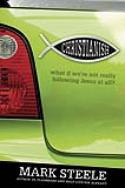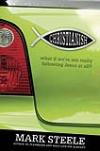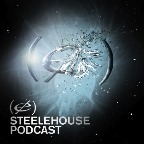Mark Steele: Man on a Christianish Mission

So there you are on your mission: you're on the move, minding your own business and making your way to your destination. Traffic is moving smoothly. And everyone is obeying the rules and staying in their lanes and out of yours.
But then it happens. Someone veers over and cuts you off. How could this be? Oh wait. Of course. There’s no icthys symbol on the car’s bumper. But would that really have made a difference? And then would you respond any differently? Probably not. So maybe out comes something ugly from your mouth. Or a gesture from your hand. Perhaps it’s just a fleeting bad thought. Either way you slice it, it’s something that’s not very Christian. Something … a little more Christianish.
It's somewhere we've all been before, finding ourselves in situations where the ugliness of who we really are and how we’re not living like Christ comes out in full display.
“We have trained ourselves to cope well on a Christianish path,” acknowledges author Mark Steele. “It’s a path where we please the right godly people and don’t feel the guilt when our failings are seen by the world at large. But this is not the approach to Jesus that we were created to take. The way is not church. The way is not ideology. The way is not Christian. The way is Jesus.”
It’s the premise for Steele’s third book, Christianish, which released this month from David C Cook. As in his first two literary endeavors (Flashbang: How I Got Over Myself and Half-Life/ Die Already), he draws from the often hilarious experiences from his own life as he fleshes out principles learned from the life and words of Christ.
A former standup comedian, Mark Steele is the president and executive creative of Steelehouse Productions, a company that creates art for business and ministry through film, stage and animation. This husband and father also recently welcomed his fourth child into the family and took time in his busy schedule to talk with Crosswalk.com about his latest book, what it means to live like Christ and how to ditch the ish. …
It was so funny because that incident happened like the day before I was desperately grappling with what is the word picture that really describes what’s going on here with this Christianish identity. What I don’t think we as Christians tend to own up to (most of the time) is this idea that is the heart of the book: Ministry is surgery. And if you and I have ever proclaimed to be living for Christ, if you and I have ever gone to church or been involved in a Christian organization or spoken out about Christ, whether we want to be one or not, we are now ministers because our lives are now observed. They’re observed not just in the context of who are we, but they’re now observed in the context of who is Christ and who is he in our lives.
So whether we want to be or not, we’re ministers. And whether we want it to be or not, ministry is surgery. We’re wielding blades. But the problem with modern Christianity is that we don’t think we’re wielding blades. We act like we’re wielding pencils—that our actions and our words can be easily retracted. But they can’t. Our modern actions and our modern words and the American Christian subculture has done a lot of good—a lot of surgical good—and a lot of damage. And it’s not just an issue of intentions.
So when my wife was grooming [with scissors] her sweet little dog Scout, she had all the best intentions in the world. But because of the distractions that were besetting her at the moment and because of everything else that was on her, the scenario of damage is what arose instead of the scenario of prettying him up. He was irrevocably harmed and to this day, though a lot of his tongue has grown back, there’s still this snake-like wedge right in the middle of his tongue. It always causes people to say, “What happened to you?” And that’s the result of our lives.
This book wasn’t meant to be a condemning book of “Oh no! Look what we’ve done. Nothing can be done about it!” But it is a call to more accountability. I’m no theologian. All I know is that I’ve messed it up a whole bunch, and if I’m honest with myself I see these eleven things that the book goes into. I see how I’ve been Christianish. And I want all of us to recognize it and try to work out of it.
In the journey from Christianish to Christian, you talk about exposing “the rough stuff” and how Jesus had a scandalous history in his lineage. Why should that encourage us and how does it show that we need to deal with our own rough stuff?
Well, I do think that this is changing a little bit in the modern church, but in the church that I grew up in you were definitely supposed to put on your Sunday best. And I don’t just mean your clothes. We all know that that means the persona of your own life and your family. There was a real pressure to feel like everything was just right. Now we don’t have those pressures quite the same way in the modern church, but everyone is still trying to seem like they have their act together.
I loved the fact that Jesus was born into this world with this scandalous history. And then, talk about the fact that it’s the very first passage that we get in the New Testament that is the preface into Christ’s life. This is the lineage of all the people in Christ’s history who came before him, and it rattles one name off after another and it only stops when it talks about David and Solomon. And it interrupts their story to talk about the fact that Solomon’s mother was originally the wife of Uriah—the man that David had killed.
So it throws this big reference to this huge scandal and this huge sin instead of focusing on all the other wonderful things David did. And that makes a point of saying, “But wait ... let’s stop for a moment and recognize in Jesus’ history there’s that huge mistake.” And I love that the Bible goes to the work of doing that, because all of us have huge mistakes in our past. Sometimes it’s in our family line. Sometimes it’s our own issue. But that passage makes the point to say that Jesus did not shy away from his own scandalous history. He didn’t disguise his rough stuff. He made it clear, because when you really look into what does that passage do to us … wow, the Savior of the world was able to come from that. That changes me. It does something to me to realize that the most transformative force in the history of the universe came from some of the same rough stuff that I come from.
In acknowledging our rough stuff, we have to surrender. There’s an incident you talk about involving your two older sons and how they were caught disobeying. Will you talk a little bit about how differently each responded to discipline and what we can learn from their examples?
My sons are wonderful. They’re the best kids I could possibly have, but they’re kids. As Christianish goes into, one day I caught them disobeying and they very quickly, simultaneously, lied about it—a ridiculous lie that made absolutely no sense. It resulted in each of them getting spanked. It talks about the ordeal that happens in the way Jackson deals with punishment and the way Charlie deals with punishment.
The reason I love this story is because you think it’s going to be an example of how Charlie’s way is better, because Charlie is just very quickly subservient and takes the spanking while Jackson, on an epic scale, resists the punishment and fights it. Where the chapter actually goes is that the reason in some ways Jackson’s resisting of the punishment is better is because we see Jackson’s rough stuff. We know exactly where we stand with the struggles that he wrestles with. And by the end of that wrestling match, that involves us as parents as well. We see change. On the other hand, we’ve got Charlie going through the motions doing all the exact right things but we don’t know where his heart is playing in the role.
God is looking for heart transformation, and most of the time heart transformation requires showing a side of ourselves we don’t want people to see. But unless we show them the part of us we don’t want them to see, they also won’t see the heart transformation. Witnessing heart transformation is one of the most powerful transformative powers for other people in this world, because they understand that Christ is pure—but what is completely irrational to a world seeking the truth is why I, a failed human being, would wrestle with right and wrong and choose right. And if they can see me wrestle and make the right choice, it’s a huge witness.
You also talk about the Church’s “acceptable addiction” which is our need to be seen as correct—and not only that Christ be seen as the way, but rather that our personal approach be as seen as "the way" to the way. Where is the balance between standing for Truth and not pushing people away?
There is a fine balance. God does want us to stand for absolute Truth and for integrity and character and to stand up for what we know is right and against what we know is wrong. But he did not call us to hate people. And the trickiest part of our faith is this: The Word of God makes it clear that it is God’s job and role to convict people into life change. Nowhere in Scripture does it make that the human being’s role. It is a human being’s role to love a person to Jesus.
Now, the problem here is you do have a lot of people in the Church who buy into that scripture. But what they do to love people to Jesus is they okay the sin issues, and they water down the faith and that’s not acceptable either. We’ve got to find a new language, a new dictionary that communicates, “You know what? I do disagree with your belief system. I do disagree with your way of life, but I still like you as a person." And their response is always, “But you think I should change, don’t you?” And to which should be our answer: “You know what? It doesn’t matter if I think you should change. It matters if you’re willing to accept the love of Christ. Once you accept the love of Christ, he’s going to change your heart.
All I’m saying is “lead with love.” I think you can certainly agree that we’ve led with animosity. We’ve lead with “you’re wrong.” And yes, they very well may be wrong. But God leads with “you’re wrong.” We lead with “he loves you.” It’s not a magic formula, and it’s a tough call but it’s the only thing that’s going to actually bring those people to Christ. And that is the important equation when you sit down with it and what will actually transform their lives.
You detail another story of how you found your Christmas present from your brother Dav before Christmas when you were kids. You tie that in with the question that a lot of us ask, “What’s in this Christian life for me and can I have it right now?” Why do we approach living like that?
Nobody likes a recession. Recessions are not fun, they’re painful and when they start they harbor a lot of fear. And you know why they harbor a lot of fear? Because we can’t imagine going without the wealth that we have. We can’t imagine the scope of our lives lessening in the way that it changes. But it is so good for us when it does, because when we suddenly have to go without, our perspective changes on why we went with in the first place.
And that comes from the chapter, “Vanilla Me,” which is a very intentional title because it really goes into the descriptive word “vanilla” and that is what we as followers of Christ become more and more and more, the more we have. And I’m just not talking about the more we obtain. I know wealthy people who are very strong followers of Christ and are by no means vanilla, because the things they have don’t have them. You know what I mean? But I know people who don’t have much but they are so stuck on the fear and worry. And sometimes it’s not greed. Sometimes it’s the fear of being without, but the blessings own them.
And so this story goes into this whole idea of not just things but the whole idea of Christmas Eve, and as a child on Christmas Eve of laying awake all night, desperately needing that wrapped thing. And not just needing it, but needing it right now and needing to consume it whole and needing to not wait and needing to have everything fulfilled.
In the Word, people of faith did not get quick answers and did not get easy answers. We often focus on the idea that God revealed himself in person. And we think that he just doesn’t do that anymore so we must not be as good—when in reality, the moments that they got to see him were so few and far between and sometimes so difficult to assess what to do next.
We forget that there is something in the wrestling match of life of working out our faith, working out what God is saying, what it means. Following him every day, surrendering to him every day. That builds us and causes us to grow so strong in our faith and in our relationship with him that we can actually help transform this world or point others around us to Jesus. All of these things he’s commissioned us to do become realities because of the lifelong struggle. But we want it unwrapped now. And it’s a mindset that we, as a body, have got to move away from. We’ve got to embrace the mystery, and the conundrums and the veils that come along with following Christ.
Christianish feels different in tone and format than your first two books—perhaps a little more mellow and less high adrenaline. Was that intentional or was that a variation that was dictated by the subject matter?
It was a little bit of both. It was intentional that I wanted to really steep this book in a flow. If you’ll look deeply into the themes of each chapter, you’ll see how they parallel to the portions of Christ’s life that I’m talking about. It goes in order from his birth and his “scandalous history” all the way to when he left this earth after having risen from the grave. So, it takes his life in order and I wanted to have that sort of linear thinking in it. But outside of that, I wanted a more accessible book.
I love the tone of my first two books. They do tend to be a little more manic, but the downside of that is you have to get all the way through the book to really glean every ounce of what’s in it. And I wanted to created something a little more segment-able so that people could sit down with a single chapter, get the laugh, get the story, get the aha moment, get the teaching in it and then set it down. To follow how we transition from Christianish to truly followers of Christ, this was the approach that fit best.
Looking toward the future, you and your wife just had your fourth child at an “older age in life.” Could this perhaps provide fodder for your next book?
Well, it just depends. I do have a book in mind at some point of what it means to come to Christ as a child, as opposed to what we as adults have redefined what it means to come to Christ as a child. But I’m going a complete different direction with my next book if my publisher will have it.
Any final thoughts regarding Christianish and why people should give it a try and ditch the ish?
I certainly hope those who’ve read the first two books will realize it’s the same comic sensibilities and intentional message like the first two. But those who haven’t given my works a try before, I hope that this will be the most accessible place to start. And hopefully it’ll get you thinking.

To read an excerpt from Chapter One, "Scandalous," click here.

Mark Steele is the President and Executive Creative of Steelehouse Productions in Tulsa, Okla. He is also cohost of "Steelehouse Podcast,” along with Steelehouse director and writer Jeffrey Huston, where each week they discuss God in pop culture.
To listen to the weekly podcast, please visit www.steelehouse.com or click here. You can also subscribe for free to "Steelehouse Podcast” through iTunes.
Originally published August 04, 2009.







